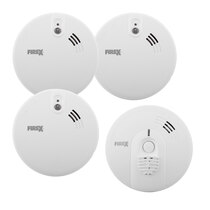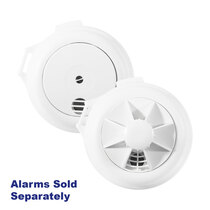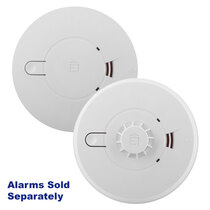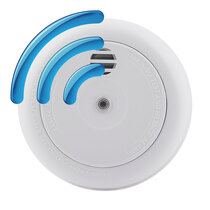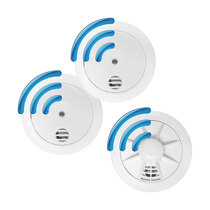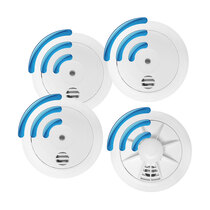-
Contact
Sales & Customer Service
0800 612 6537 support@safelincs.co.uk Live ChatDelivery Enquiries
0800 077 6149 - Resources
Fire & Safety Solutions
CALL OUR TEAM NOW 0800 612 6537
Lines open today 8am - 6pm
FREE Delivery
on marked products
Live Chat - Online
Instant help & Advice
Trade Discounts
and exclusive pricing
0% Credit Available
Open an account now
5 Star Customer Feedback
Alarms Suitable for English Landlord Regulations
Regulatory compliance protects tenants while fulfilling legal obligations. Updated smoke alarm regulations require landlords to provide comprehensive fire and carbon monoxide detection in rental properties throughout England. The October 2022 changes mandate smoke alarms on every storey and carbon monoxide detection near fuel-burning appliances, with strengthened rules addressing identified safety gaps in rental property protection. October 2022 Changes Enhanced requirements mandate smoke alarms on every storey and carbon monoxide detection near fuel-burning appliances. These strengthened rules address identified safety gaps in rental property protection. Testing becomes a legal requirement, with landlords responsible for ensuring alarm functionality at tenancy commencement. Regular maintenance and testing throughout tenancies maintains ongoing compliance. Documentation requirements include keeping records of alarm testing and maintenance activities. Proper records demonstrate due diligence and regulatory compliance during inspections or incidents. Penalties for non-compliance include substantial fines and potential prosecution. Local authorities have enhanced enforcement powers to ensure landlord compliance with safety obligations. Approved Detection Systems Grade F2 systems provide a good level of protection for many rental properties through battery-powered interconnected alarms. These systems offer cost-effective solutions and meet basic regulatory requirements. Grade D installations use mains-powered alarms with battery backup for enhanced reliability. Professional electrical installation ensures proper operation and long-term effectiveness. Sealed battery systems eliminate tenant interference with detection equipment. Tamper-proof designs ensure continuous protection throughout tenancy periods without maintenance concerns. Wireless interconnection suits older properties where hardwired systems prove impractical. Radio-frequency networks provide connectivity without any complicated wiring required. Strategic Implementation Portfolio approaches enable consistent protection standards across multiple properties. Standardised systems simplify maintenance scheduling and spare parts management and ensure reliable protection. Tenant education improves system effectiveness through proper use and basic maintenance awareness. Clear instructions help tenants understand their responsibilities and preserve landlord compliance. Property-Specific Requirements Student accommodation requires enhanced detection reflecting high-risk occupancy patterns. Multiple occupants and lifestyle factors demand robust systems with comprehensive coverage and reliable operation. Houses of Multiple Occupation need addressable systems for larger installations. Central monitoring and zone identification capabilities suit complex properties with multiple independent living areas. Holiday rentals must comply despite short-term occupancy patterns. Automated systems and professional maintenance ensure consistent protection without imposing management burdens on tenants. Older properties may need upgraded electrical infrastructure to support modern detection systems. Professional surveys identify necessary improvements to achieve compliant installations. Economic Considerations Initial investment in quality systems provides long-term value through reduced maintenance costs and enhanced tenant satisfaction. Professional-grade equipment offers superior reliability and longevity. Insurance benefits may include premium reductions for properties with approved fire detection systems. Enhanced safety measures demonstrate risk reduction to insurance providers. Property values benefit from modern safety systems that appeal to safety-conscious tenants. Comprehensive fire protection becomes a competitive advantage in rental markets. Our English compliance solutions provide complete systems meeting regulatory requirements. Professional guidance ensures appropriate selections for specific property types. For comprehensive compliance planning, explore our regulatory guides that explain requirements and approved implementation strategies. Achieve full regulatory compliance with professional fire safety expertise. Contact our English regulation specialists for comprehensive advice on meeting landlord obligations effectively. Frequently Asked Questions (FAQs) What are the current smoke alarm regulations for English rental properties? Current smoke alarm regulations for English rental properties require smoke alarms on every storey and carbon monoxide detectors near fuel-burning appliances, with professional testing at tenancy start. Do English landlords need to install mains-powered smoke alarms? English landlords are not specifically required to install mains-powered smoke alarms, though they must ensure adequate detection systems that may include battery-powered or hardwired options, depending on property requirements. How often must landlords test smoke alarms in rental properties? English landlords must ensure smoke alarms are tested and working at the start of each new tenancy, with ongoing responsibility for maintenance though specific testing frequencies are not prescribed. What penalties exist for non-compliance with English smoke alarm regulations? Non-compliance with English smoke alarm regulations can result in fines up to £5,000 and prosecution, with local authorities having powers to enforce compliance through various measures.
Read more about English landlord alarm regulations...
Mains Powered 3 Smoke Alarms and 1 Heat Alarm Kit with Alkaline Back-up Battery - Kidde Firex KF Series
- Power: 230V mains powered with alkaline back-up battery
- Back-up Battery: 9V alkaline battery (included)
- Warranty: 6 year warranty
- Hardwire interlink with up to 24 devices
- Suitable for BS 5839-6: 2019 Grade D2 installations
- Also suitable for both the Welsh and Scottish 2022 legislation
Mains Powered 3 Smoke Alarms and 1 Heat Alarm Kit with Self-Charging 10 Year Back-up Battery - Kidde Firex KF-R Series
- Power: 230V mains powered with self-charging lithium back-up battery
- Back-up Battery: Self-charging 10 year back-up battery
- Warranty: 6 year warranty
- Hardwire interlink up to 24 compatible devices
- Suitable for BS 5839-6: 2019 Grade D1 installations
- Compliant with Scottish 2022, Welsh Landlord 2022, and Northern Ireland Landlord 2024 legislation
Mains Powered Smoke Alarms & Heat Alarms with Alkaline Back-up Battery - Firehawk BB Series
These Firehawk mains-powered smoke and heat alarms with hardwire interlink and replaceable AAA alkaline back-up batteries are suitable for Grade D2 systems to warn all occupants of a fire.
- 230V mains power with alkaline battery backup
- 6 years manufacturer's warranty
- Hardwire interlink up to 15 Firehawk FHN smoke and heat alarms.
- Also suitable for the 2022 Scottish legislation
Mains Powered Smoke Alarms & Heat Alarms with Alkaline Back-up Battery - Aico Ei140e Series
- 230V mains powered with alkaline back-up battery
- Available in Optical and Heat versions (Ei146e, Ei144e)
- Made in Ireland by Ei Electronics
- Interlinks with up to 12 units
- Kitemarked, CE marked and suitable for BS 5839-6: 2019 Grade D2 installations
- Please note: Alarms are sold individually
- Also suitable for both the Welsh and Scottish 2022 legislation
Mains Powered Radio-Interlink 2 Smoke Alarms and 1 Heat Alarm Kit with Alkaline Back-up Battery - Aico Ei140eRF Series
- Power: 230V mains powered with alkaline back-up battery
- Back-up Battery: 9V alkaline battery (included)
- Warranty: 5 year warranty
- Radio-interlink with up to 12 compatible devices
- Suitable for BS 5839-6: 2019 Grade D2 installations
- Compliant with Scottish 2022, Welsh Landlord 2022, and Northern Ireland Landlord 2024 legislation
Mains Powered Radio-Interlink 3 Smoke Alarms and 1 Heat Alarm Kit with Alkaline Back-up Battery - Aico Ei140eRF Series
- Power: 230V mains powered with alkaline back-up battery
- Back-up Battery: 9V alkaline battery (included)
- Warranty: 5 year warranty
- Radio-interlink with up to 12 compatible devices
- Suitable for BS 5839-6: 2019 Grade D2 installations
- Compliant with Scottish 2022, Welsh Landlord 2022, and Northern Ireland Landlord 2024 legislation
Mains Powered Smoke Alarms & Heat Alarms with Self-Charging 10 Year Back-up Battery - Firehawk RB Series
With self-charging back-up batteries, these mains-powered smoke and heat alarms from Firehawk won't need new batteries for their full 10 year lifespan. Ideal for Grade D1 and Scottish installations.
- 230V mains power with self-charging lithium battery backup
- 10 years manufacturer's warranty
- Hardwire interlink up to 15 Firehawk smoke and heat alarms.
- Also suitable for the 2022 Scottish legislation
Mains Powered Smoke Alarms & Heat Alarms with Self-Charging 10 Year Back-up Battery - Aico Ei3000 Series
- Available in Optical, Heat, Combined Optical & Heat, and Combined Heat & CO
- Mains powered alarms with sealed lithium back-up battery
- AudioLINK technology fitted as standard
- Interlinks with up to 12 compatible devices
- Compatible with Ei3000MRF SmartLINK Module for radio-interlinking
- Suitable for BS 5839-6: 2019 Grade D1 installations
- Also suitable for both the Welsh and Scottish 2022 legislation
Mains Powered Carbon Monoxide Alarm with Self-Charging 10 Year Back-up Battery - Aico Ei3018
- Product Lifespan: 10 years
- Power: 230V mains powered with battery backup
- Backup Battery: Re-chargeable lithium battery
- Warranty: 5 year warranty
- AudioLINK: real time data extraction to a smart phone
- High performance electrochemical sensor
- Hardwire interlink with up to 12 compatible alarms
- Kitemarked to BS EN 50291-1: 2010
- Suitable for ceiling installation
- Also suitable for both the Welsh and Scottish 2022 legislation
Mains Radio-Interlink Smoke Alarms & Heat Alarms with Self-Charging 10 Year Back-up Battery - Aico Ei3000RF Series
- Available in Optical, Heat and Combined Optical and Heat
- Mains powered alarms with tamper-proof lithium back-up batteries
- Suitable for BS 5839-6: 2019 Grade D1 installations
- Supplied with an Ei3000MRF SmartLINK Module for radio-interlinking
- Hybrid (wired or wireless) interlinking with up to 12 compatible devices
- Please note: alarms are sold individually
- Also suitable for both the Welsh and Scottish 2022 legislation
Mains Radio-Interlinked Carbon Monoxide Alarm with Self-Charging 10 Year Back-up Battery - Aico Ei3018RF
- Product Lifespan: 10 years
- Power: 230V mains powered with battery backup
- Backup Battery: Re-chargeable lithium battery
- Warranty: 5 year warranty
- High performance CO sensor
- Interlinking with up to 12 devices
- Radio-interlinking via SmartLINK module (supplied)
- Kitemarked to BS EN 50291-1: 2010
- Suitable for ceiling installation
- Also suitable for both the Welsh and Scottish 2022 legislation
Radio-Interlinked Sealed Battery 3 Smoke, 1 Heat, and 1 CO Alarm Kit - Hispec RF10-Pro Range
- Battery: 10 year sealed lithium battery
- Warranty: 5 year warranty
- Radio-interlink up to 20 Hispec RF10-Pro Alarms
- Suitable for BS 5839-6: 2019 Grade F1 installations
- Compatible with the Hispec Control Unit
- Also suitable for the 2022 Scottish legislation
Mains Powered 2 Smoke Alarms and 1 Heat Alarm Kit with Alkaline Back-up Battery - Aico Ei140e Series
- Power: 230V mains powered with alkaline back-up battery
- Warranty: 5 year warranty
- 2 x optical smoke alarms and 1 x heat alarm included
- Test and hush buttons
- Hardwire interlink with up to 12 devices
- Suitable for BS 5839-6: 2019 Grade D2 installations
- Compliant with Scottish 2022, Welsh Landlord 2022, and Northern Ireland Landlord 2024 legislation
Mains Powered 3 Smoke Alarms and 1 Heat Alarm Kit with Alkaline Back-up Battery - Aico Ei140e Series
- Power: 230V mains powered with alkaline back-up battery
- Warranty: 5 year warranty
- 3 x optical smoke alarms and 1 x heat alarm included in the kit
- Central test and hush buttons
- Hardwire interlink with up to 12 devices
- Suitable for BS 5839-6: 2019 Grade D2 installations
- Compliant with Scottish 2022, Welsh Landlord 2022, and Northern Ireland Landlord 2024 legislation
Radio-Interlinked 10 Year Sealed Battery Optical Smoke Alarm - UltraFire ULLS10RF
Supporting wireless interlink with up to 15 total alarms to cover the whole house, the UltraFire ULLS10RF optical smoke alarm features a sealed 10 year battery and 10 year manufacturer's warranty.
- Battery: 10 year sealed lithium battery
- Warranty: 10 year manufacturer's warranty
- Optical smoke sensor suitable for hallways, landings, living rooms, and bedrooms
- Wireless interlink up to 15 total alarms
Radio-Interlinked 10 Year Sealed Battery 2 Smoke Alarms & 1 Heat Alarm Kit - UltraFire ULL10RF
- FREE delivery
- Battery: 10 year sealed lithium battey
- Warranty: 10 year manufacturer's warranty
- Wirelessly interlink up to 15 UltraFire ULL10RF devices
- 2 x optical smoke alarms and 1 x heat alarm included
- Suitable for BS 5839-6: 2019 Grade F1 installations
- Compliant with Scottish 2022 and Northern Ireland Landlord 2024 legislation
Radio-Interlinked 10 Year Sealed Battery 3 Smoke Alarms and 1 Heat Alarm Kit - UltraFire ULL10RF Series
- FREE delivery
- Battery: 10 year sealed lithium battey
- Warranty: 10 year manufacturer's warranty
- Wirelessly interlink up to 15 Ultrafire ULL10RF devices
- 3 x optical smoke alarms and 1 x heat alarm included
- Suitable for BS 5839-6: 2019 Grade F1 installations
- Compliant with Scottish 2022 and Northern Ireland Landlord 2024 legislation
Page 2 (37 of 37 Products)
2022 English Legislation
Alarm Power Requirements
Interlink Compatibility
2022 English Legislation
From 1st October 2022 in England and Wales, The Smoke and Carbon Monoxide Alarm (Amendment) Regulations 2022 will require all social housing providers and landlords to ensure suitable, working smoke and carbon monoxide (CO) alarms are installed in their properties. This expands the scope of the 2015 landlord regulations which originally excluded social housing and focused on the private rental sector.
A general summary of the new requirements are:
- One smoke alarm on each storey where there is a room used as living accommodation.
- One carbon monoxide alarm in any room used as living accommodation which contains a fixed combustion appliance (excluding gas cookers).
- Ensure smoke alarms and carbon monoxide alarms are repaired or replaced once informed and found that they are faulty.
- Alarms must be installed in compliance with British Standards BS 5839-6.
- Where there is a carbon-fuelled appliance (e.g. boiler or gas cooker) or a flue, a carbon monoxide alarm is also required.
- Where battery powered alarms are selected, alarms with 'sealed for life' batteries are recommended.
It is the landlord's duty to ensure a sufficient number of suitable alarms are installed correctly and working at the start of each tenancy. After this, the tenants must perform regular testing and maintenance (including replacing batteries). If an alarm is faulty and replacing the batteries does not rectify the issue, the tenant must inform the landlord who will arrange the repair or replacement of the alarm. However, landlords are recommended to provide a demonstration and instructions to tenants for the testing and maintenance, and must make an informed decision to meet the needs of tenants with special requirements or disabilities.
Alarm Power Requirements
Although the new legislation does not directly state the power source or interlink type required for alarms to be compliant, Government guidance does say that alarms should comply with British Standard BS 5839-6, the Code of Practice for Fire Detection and Alarm Systems in Domestic Premises. BS 5839-6: 2019 also has a table of recommended alarms for different types of domestic premises, with rented properties being advised to install Grade D1 alarms in Category LD2 positions – all circulation spaces that form part of escape routes plus all rooms and areas that present a high fire risk to occupants, such as kitchens and living rooms.
Any mains-powered alarms, regardless of sensor type, must be permanently wired into a mains circuit. Alarms which use a mains plug are not suitable for the updated regulations.
Smoke & Heat Alarm Grades
British Standard 5839 Part 6 is a code of practice relating to the design, installation and maintenance of fire detection systems in domestic premises. The standard also grades fire detection systems which reflects their functionality and capability. The below table details the up-to-date grades for fire detection systems.
Alarm Grades by Power Type (BS 5839 Part 6)
| BS 5839-6: 2019 Grade | Alarm Power Type | Grade Description |
|---|---|---|
| Grade F1 | Battery Operated (Lithium) | System of one or more battery-powered smoke alarms (and heat alarms if required). The battery must be tamper-proof and last the full life of the alarm. |
| Grade F2 | Battery Operated (Alkaline) | System of one or more battery-powered smoke alarms (and heat alarms if required). The battery is user-replaceable and will not last the full life of the alarm. |
| Grade D1 | Mains Powered (Lithium Back-up) | System incorporating one or more interlinked mains-powered smoke alarms (and heat alarms if required), each with an integral stand-by supply. They can be hardwire-interlinked or radio-interlinked. The stand-by supply must be tamper-proof and last the full life of the alarm. |
| Grade D2 | Mains Powered (Alkaline Back-up) | System incorporating one or more interlinked mains-powered smoke alarms (and heat alarms if required), each with an integral stand-by supply. They can be hardwire-interlinked or radio-interlinked. The stand-by supply is user-replaceable and will not last the full life of the alarm. |
| Grade C | Mains Powered (Dedicated Circuit + Back-up) | System consisting of fire detectors and alarm sounders (which may be domestic smoke alarms) connected to a common power supply, comprising normal mains and stand-by supply, with central control equipment. |
| Grade A | Mains Powered (Panel - Built-in PSU + Back-up) | Fire detection system incorporating control and indicating equipment to BS EN 54-2, power supply to BS EN 54-4, and installed to BS 5839 Part 1, with some very minor exceptions. |
For a full summary of BS 5839 Part 6, please visit 'Fire Detection and Fire Alarm Systems for Buildings'.
Interlink Compatibility
Hardwire Interlink
Smoke alarms, heat alarms, and carbon monoxide alarms powered from a mains circuit will usually also have an interlink or interconnect terminal next to the live and neutral wire terminals. If one alarm detects a fire or CO emergency it will pass the signal to the other units which will also sound an alarm throughout the property. This is particularly important for large buildings or if the bedroom is located far away from the kitchen. Outhouses and garages can also be connected into the radio-interlinked alarm system for added peace of mind.
Mains alarms can be connected to nearby lighting circuits for power, provided the light switch does not also turn off power to the alarm, but the interlink wire must be separate and not 'piggy-back' on a mains circuit as smoke, heat, and CO alarms are not designed to take 230V in their interlink terminal. If the property does not already have mains-powered alarms wired in, or if testing one of your existing alarms does not also cause the other alarms to sound, then an electrician will need to install a new interlink cable throughout the building.
Radio-Interlink
Radio-interlinked smoke alarms, heat alarms, and carbon monoxide alarms communicate with each other via radio frequency (RF). If one alarm detects a fire or CO emergency it will pass the signal to the other units which will also sound an alarm throughout the property. This is particularly important for large buildings or if the bedroom is located far away from the kitchen. Outhouses and garages can also be connected into the radio-interlinked alarm system for added peace of mind.
Radio-interlinked alarms are sometimes referred to as wireless alarms, although this can be confusing when dealing with radio-interlinked units wired into the mains power supply in a building. Radio-interlinked alarms can be battery powered or mains powered, and we even offer battery operated smoke alarms, heat alarms, and carbon monoxide alarms with radio-interlink that contain a sealed battery which lasts the full ten years of the alarm's life.
Compatibility
Only interlink alarms with alarms from the same model range and manufacturer. Alarms from different manufacturers are not compatible and attempting to interlink them could damage the alarms. If in doubt, check the instruction manual for the alarms before purchase – we provide PDF instruction manual downloads for the majority of smoke, heat, and CO alarms on our website.
Some ranges support mixing hardwired and radio-interlink alarms in the same network, which can reduce electrician costs and disruption. All alarms on each storey would be connected together via hardwire interlink, with one alarm on each storey also being connected to each other via RF signal. This could also save money on product costs, as mains-powered alarms without radio-interlink are usually the cheapest option for interlinking alarms. Please confirm before purchase if you require this functionality.




















